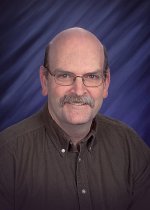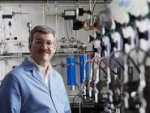Chuck Peden and Morris Bullock Named American Chemical Society Fellows
(July 2012)
Congratulations to Dr. Chuck Peden and Dr. Morris Bullock at Pacific Northwest National Laboratory on being named American Chemical Society Fellows. Peden and Bullock are among distinguished researchers nationwide recognized in 2012 by the American Chemical Society, also known as ACS, for their "outstanding achievements in and contributions to science and the profession of chemistry."
Both researchers explore aspects of catalysis, where natural or engineered molecules aid and abet chemical reactions. Because the catalysts themselves aren't chemically changed in the reactions, they can do this over and over again. Catalysis is important in almost any chemical reaction that needs to occur at the speed of life. For example, catalysts speed up reactions that reduce pollution in solar and fuel cells, in plants that convert sunlight to grow, and in pharmaceutical factories.
Charles "Chuck" Peden
A 20-year PNNL veteran and Deputy Director of the Institute for Integrated Catalysis, Peden is best known for fundamental chemistry research that led to ways to reduce pollution blowing from a car's tailpipe. His research on lean NOx catalysts included collaborations with Cummins, Inc., Ford Motor Company and General Motors. He is also a founding member of and the first to chair the section of ACS that focuses on catalysis research.
Catalysis often takes place on the surface of materials, and knowing the surface structure of catalysts helps researchers design more effective ones. For example, Peden was the first to show that an aluminum atom can have an unexpected five attachments to other atoms on a surface of the catalytic material gamma-aluminum oxide. These multiple attachments support rafts of platinum atoms that catalyze reactions.
R. Morris Bullock
Bullock has long advocated the need for inexpensive metals to replace the precious metal platinum in catalysts used for energy systems such as fuel cells, a topic on which he recently edited a book titled Catalysis Without Precious Metals. At PNNL, he leads work on metal catalysts used for energy production, and is the director of PNNL's Energy Frontier Research Center for Molecular Electrocatalysis.
Using a natural catalyst as a muse, Bullock led the design of several catalysts that are steps on the road to a practical, cost-efficient fuel cell catalyst. For example, one cranked out hydrogen gas faster than the natural muse. Another mastered reverse as well as forward, being able to both make and break molecular hydrogen.
Peden and Bullock join five other PNNL scientists honored previously by the ACS: Jean Futrell, Bruce Kay, Yong Wang, Janet Bryant and Gregg Lumetta. They add to the 568 Fellows named since ACS began their fellowship program in 2008. ACS is the world's largest chemical science professional society, with more than 163,000 members.
The 2012 Fellows will be recognized at an induction ceremony on Aug. 20 during the society's 244 National Meeting & Exposition in Philadelphia. The complete list of ACS Fellows can be found in the July 23 issue of Chemical & Engineering News.


